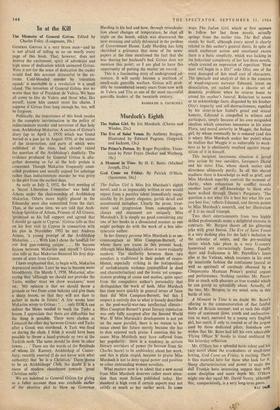In at the Kill
GENERAL GRIVAS is a very brave man—and he is not afraid of telling us so on nearly every page of this book. That, however, does not destroy the excitement, spirit of adventure and high sense of dedication which animated Grivas. Were it not for the sense of dedication the reader would find this account distasteful in the ex- treme. Cold-blooded murder by 'execution squads' is inevitable in a revolution in a small island. The terrorism of General Grivas was no worse than that of President de Valera. We have all come to like de Valera and those who, like myself, know him cannot resist his charm. I suppose if Grivas lives long enough he, too, will be forgiven.
Politically, the importance of this book resides in the complete incrimination in the policy of indiscriminate murder and terrorism of that holy man, Archbishop Makarios. A section of Grivas's diary (up to April 1, 1955) which was found buried in a jam jar in August 1956, at the outset of the insurrection, and parts of which were published at the time, had already raised the question of the Archbishop's duplicity. The evidence produced by General Grivas is alto- gether damning so far as the holy prelate is concerned. Though Makarios frequently coun- selled prudence and usually argued for sabotage rather than indiscriminate murder he was privy to the plot from the earliest days.
As early as July 2, 1952, the first meeting of a 'Secret Liberation Committee' was held in Athens under the chairmanship of Archbishop Makarios. Others more highly placed in the Ethnarchy were also committed from the start. Thus, at the same time, we are told that Arch- bishop Spiridon of Athens, Primate of All Greece, 'promised us his full support and agreed that I should go again to Cyprus.' (Grivas tells us that on his first visit to Cyprus in connection with his plot in November 1952 he met Andreas Azinas, 'a young protege of the Archbishop Makarios. . . . With him I chose the landfall for our first gun-running caique. . . . He became liaison between Makarios and myself.') Grivas also tells us that Makarios financed his first ship- ments of arms from Greece.
I have emphasised that, to begin with, Makarios deprecated murder. Later he was to become more bloodthirsty. On March 3, 1958, Makarios, after saying that 'although we should not provoke the Turks, neither must we show weakness,' went on: 'My opinion is that we should throw a grenade or two from some balcony and give them a sharp lesson, so that they will not dare to gather in mobs in future.' A few weeks later Makarios wrote to Grivas: `. . . only EOKA can deliver the blows needed to teach the Turks a lesson. I appreciate that there are difficulties but the thing is possible. There were clashes at Limassol the other day between Greeks and Turks after a Greek was murdered. A Turk was fired on during the clash. I think it would have been possible to throw a hand-grenade or two at the Turkish mob. The same should be done in other towns.. ..' These are the words of the Beatitude of whom Dr. Ramsey, Archbishop of Canter- bury, recently asserted (I do not know with what authority) that 'he is a Christian.' There Kerns to be an Archbishops' Club. No doubt it is a move of modern churchmen towards 'great Christian unity.'
We are indebted to General Grivas for giving us a fuller account than was available earlier of the abortive plot to blow up Governor Harding in his bed and how, through miscalcula- tion about changes of temperature, he slept all night on the bomb, which was discovered the next morning and safely detonated in the gardens of Government House. Lady Harding has long cherished a grievance that none of the news- papers at the time mentioned the fact that she was sharing her husband's bed. Grivas does not mention this point; so I am glad to have this opportunity of putting the matter on record.
This is a fascinating story of underground ad- venture. It will surely become a textbook of small-scale guerrilla warfare. Grivas will prob- ably be remembered twenty years from now with de Valera and Tito as one of the most successful guerrilla leaders of the twentieth century.
RANDOLPH S. CHURCHILL






























 Previous page
Previous page